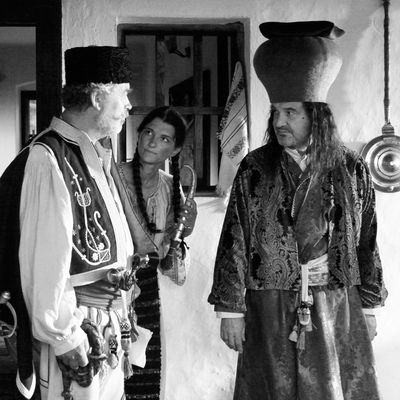
Allow me to start this review with a random, somewhat personal digression. About a decade ago, at the Istanbul Film Festival, I saw a marvelous documentary called Whose Is This Song?, made by the Bulgarian filmmaker Adela Peeva. In it, she charted the course of a popular folk song that she had heard one night in Turkey; realizing that she had grown up hearing this same melody in Bulgaria, she decided to find out where else it appeared. To her surprise, the tune (which we know in Turkey as “Kâtibim” or “Üsküdar’a Gider Iken”) turned up all over the Balkans — in Greece, Serbia, Bosnia, Albania, and elsewhere — and in each place it had a totally different meaning and history. In one place, it was a love song; in another, a battle march; elsewhere, a religious hymn. These were cultures that had, in some cases, hated and killed each other for centuries. But the melody subtly united them, making it clear that they weren’t all that different from one another.
I bring this up because Romanian director Radu Jude’s Aferim! had a similar effect on me. “Aferim” is an old Ottoman expression meaning “well done,” or “bravo.” But as evidenced by the film, which is set in Romania’s Wallachia region in the 1830s, it’s used in multiple languages — a slight, ironic expression of unity in a world of corrosive distrust. Everybody in Aferim! seems to hate and demean everyone else. And yet, they all seem like parts of the same blend of cultures — not a melting pot, but sort of a stew — that reasserts itself throughout the film.
The plot follows local lawman Costandin (Teodor Corban) and his son Ionita (Mihai Comanoiu) as they pursue Roma slave Carfin (Toma Cuzin) who has reportedly stolen and fled from the clutches of a local boyar, or nobleman. (In truth, Carfin was seduced by the boyar’s wife.) Costandin and Ionita spend much of the first half of the film riding through the forbiddingly beautiful countryside, often in long-shot, bantering with each other and whatever passersby they come across. Costandin is a fount of wickedly funny insults: He doesn’t seem to like anybody, and he has a fable, or an anecdote, or a myth, or a proverb, or a poem to offer as vague explanation why. He insists, however, that he’s a nice guy: “Though I’m as harsh as a hot pepper, born of father Garlic and mother Onion, I treat people kindly,” he says at one point.
And it’s not like the people they meet are much better. One priest goes on a rant in which he lists what’s wrong with every nationality, or ethnicity. (“Armenians are lazy … Turks have many wives, Arabs have many teeth … Greeks talk too much.”) Meanwhile, the film’s nonstop expressions of contempt and fear provide a sharp contrast to its visual beauty (shot in widescreen black-and-white by Marius Panduru), its ambling demeanor, and Jude’s generous use of the frame. Visually, people are always seen together in Aferim! — close-ups are rare — as if the very image itself were putting the lie to their exceptionalist world-views.
Still, no matter how much people despise each other in this film, it seems that they have infinite reserves of scorn set aside for the Roma (or gypsies, as they were once called), used as slaves and demeaningly referred to as “crows.” Everybody’s got a story about how awful they are. But once they find Carfin and begin their journey back, Costandin and Ionita begin to warm to the man. On their way back, Costandin even seems to suggest that the boyar won’t be too harsh on the runaway slave.
Like much of Romanian cinema, Aferim!’s narrative and stylistic gambit doesn’t quite click until the final scenes, when the verbal cruelty demonstrated throughout the film — a cruelty whose creativity and elaborateness even provokes its share of laughter at times — finds its analogue in real-world physical cruelty, in a scene that’s almost unbearable to watch and which speaks to where the real power in this world lies. At this moment, this drifting, talky road movie and its chatty characters find themselves at a loss for words. And suddenly, a land in which people were ironically united in their hatred for one another, truly feels like it has been broken into pieces.





